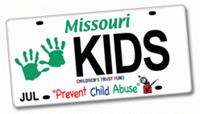The Children’s Trust Fund’s primary public education campaign is "Prevent Shaken Baby Syndrome" and is designed to heighten the awareness of the dangers of shaking a baby and encourage a plan of prevention.
Everyone who cares for a baby needs to know about Shaken Baby Syndrome (SBS).
SBS refers to the many serious and often fatal injuries that result when an infant or young child is violently shaken. Babies are hurt because their weak neck muscles are not strong enough to support their disproportional large head. When an infant or young child is violently shaken, the brain bounces back and forth within the skull, bruising or destroying brain tissue, tearing blood vessels and often causing retinal bleeding. This can result in brain seizures, paralysis, blindness and death.
In 2006, of the 27 Missouri child abuse fatalities as a result of inflicted injury at the hands of a parent or caretaker, 12 were victims of SBS. (The Missouri Child Fatality Review Program Annual Report 2006)
Shaking generally occurs when a frustrated caregiver becomes overwhelmed with an unconsolable crying baby. It is all right for a baby to cry if all of their needs have been met. If you or someone has the urge to shake a baby — STOP! Place the baby in a safe place, walk away, take a deep breath, count to 100, listen to soft music, take a hot shower … do anything to calm down.
Remember, babies will cry and a plan is necessary.
SBS can be prevented. Make sure that everyone who cares for your child knows about the dangers of shaking and give them permission to contact you anytime they become frustrated or angry.
CTF sponsors and provides brochures, television commercials, and public service announcements to work together to support the campaign. In 2002, CTF developed and made available two versions of the "Prevent Shaken Baby Syndrome" videotapes. Hospitals throughout Missouri incorporate the parent video into their newborn and childbirth programs, and the Missouri Department of Health and Senior Services Bureau of Child Care includes the caregiver video as part of its Child Care Orientation Training for providers statewide.




